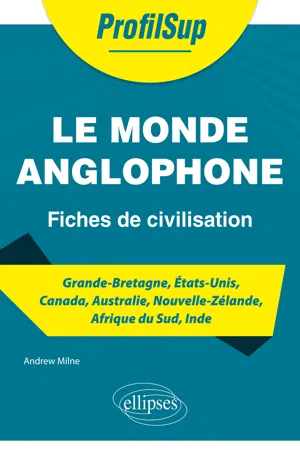
This is a test
- French
- ePUB (adapté aux mobiles)
- Disponible sur iOS et Android
eBook - ePub
Le monde anglophone - Fiches de civilisation
Détails du livre
Aperçu du livre
Table des matières
Citations
À propos de ce livre
Cet ouvrage propose d'apprendre l'histoire de pays tout autour du monde: la Grande-Bretagne, les États-Unis, le Canada, l' Australie, la Nouvelle-Zélande, l' Afrique du Sud et l' Inde. Il compte:
- Toute l'histoire de chaque pays jusqu'à aujourd'hui;
- De nombreux documents sur lesquels s'appuyer,
- Du vocabulaire,
- Des exercices corrigés,
- Des encarts «Pour aller plus loin».
Foire aux questions
Il vous suffit de vous rendre dans la section compte dans paramètres et de cliquer sur « Résilier l’abonnement ». C’est aussi simple que cela ! Une fois que vous aurez résilié votre abonnement, il restera actif pour le reste de la période pour laquelle vous avez payé. Découvrez-en plus ici.
Pour le moment, tous nos livres en format ePub adaptés aux mobiles peuvent être téléchargés via l’application. La plupart de nos PDF sont également disponibles en téléchargement et les autres seront téléchargeables très prochainement. Découvrez-en plus ici.
Les deux abonnements vous donnent un accès complet à la bibliothèque et à toutes les fonctionnalités de Perlego. Les seules différences sont les tarifs ainsi que la période d’abonnement : avec l’abonnement annuel, vous économiserez environ 30 % par rapport à 12 mois d’abonnement mensuel.
Nous sommes un service d’abonnement à des ouvrages universitaires en ligne, où vous pouvez accéder à toute une bibliothèque pour un prix inférieur à celui d’un seul livre par mois. Avec plus d’un million de livres sur plus de 1 000 sujets, nous avons ce qu’il vous faut ! Découvrez-en plus ici.
Recherchez le symbole Écouter sur votre prochain livre pour voir si vous pouvez l’écouter. L’outil Écouter lit le texte à haute voix pour vous, en surlignant le passage qui est en cours de lecture. Vous pouvez le mettre sur pause, l’accélérer ou le ralentir. Découvrez-en plus ici.
Oui, vous pouvez accéder à Le monde anglophone - Fiches de civilisation par Milne Andrew en format PDF et/ou ePUB ainsi qu’à d’autres livres populaires dans Langues et linguistique et Linguistique. Nous disposons de plus d’un million d’ouvrages à découvrir dans notre catalogue.
Informations
Sous-sujet
LinguistiqueChapter 1
United Kingdom

I. The United Kingdom and the British Empire
a. Early Beginnings of the First English Empire
It is not really until the reign of Elizabeth I (1558-1603) of England that what was later to become known as the British Empire began to take shape. Until the last decades of the 16th century, there had been little attempt by the English to expand and to take possession of other countries. The 1532 Statute in Restraint of Appeals, under Henry VIII (the father of Elizabeth I and the monarch that split with the Catholic Church), made the king the last person to appeal to in all matters of the realm of England, and to all intents and purposes ousting the Pope from the authority above the monarch. The realm of Henry VIII was defined in the Statute in Restraint of Appeals as “an empire”, although in the real sense of the word it was not yet that. However, it did mean that the divide with the Catholic Church over Henry’s marriages lead England to become immediately the enemy of France, Spain and Portugal, the leading Catholic countries of the world at the time and also those that were and had been attempting to conquer other lands and create colonies. England had only established a colony in Ireland, through the settling of Protestants there, but it was really in 1578 when Elizabeth I granted letters patent to Sir Humphrey Gilbert for overseas exploration and with the intention of conquering other lands, thus being able to prove English worth in the face of French, Spanish and Portuguese successes around the world that were already bringing in vast amounts of wealth for them. Gilbert intended to sail for the Caribbean and establish a colony in the Americas there for England and the Queen. However, the first attempt did not succeed and never even managed to get across the Atlantic. The second attempt was to go to Newfoundland, claim it for England, which he did manage to do. But he never left anyone behind to set up a colony there. Newfoundland is a large island off the coast of North America, and it was claimed on 5th August 1583 as England’s first foreign territory. The English Empire was beginning and would later be transformed into the British Empire, spanning almost one quarter of the population in the world (412 million people) by the outbreak of World War I and 24% of the land area on the planet. By the defeat of Napoleon at the end of the Napoleonic Wars (1803-1815), Britain had become the policeman of the world and the unchallenged power, a global hegemon. British dominance was known as Pax Britannica, or British Peace, meaning that nobody had enough power in the world to challenge the British, thus meaning that they were able to do what they wished for most of the 19th century in terms of colonisation and control of the world. This might be some rather strange definition of peace, simply because they were the strongest and the wealthiest nation.
Gilbert died on the return journey to England after having taking possession of Newfoundland but Elizabeth I provided letters patent to his half-brother, Sir Walter Raleigh (c. 1552-1618) in 1584, inviting him to take possession of lands that were “not actually possessed of any Christian Prince, nor inhabited by Christian People, as to him, his heirs and assignee” forever. Elizabeth I was so certain that there was immense wealth to be found that she allowed Raleigh and his heirs to take possession forever of 4/5 of everything that he found, including the land. He would have to pay 1/5 of everything to the Crown. Raleigh founded the Roanoke Colony on the coast of North Carolina (today). But the colony failed. The fact that Elizabeth I gave Raleigh the sole right to take possession of lands that were not already possessed by other ‘Christian Princes’ is questionable since technically-speaking Elizabeth did not recognize the authority of the Catholics and so, therefore, it is debatable as to what she might have considered as being a land possessed by a ‘Christian Prince’. It was not until the succession to the throne by James VI, King of Scots and also James I of England in 1603, after the childless death of the Virgin Queen, Elizabeth I, that there was a shift from taking the lands (or attempting to) from the Catholic monarchs of France, Spain and Portugal and a desire to conquer new lands in England’s own right. Scotland and England would not join together as one combined country until the Act of Union of 1707. James I of England signed the Treaty of London with Spain and put an end to conflict between the two countries and thus allowed for England to leave those possessions belonging to the Catholics alone, to some extent.
1. Roanoke Colony
The Roanoke Colonies (there were two of them) failed. The first had Governor Ralph Lane appointed in 1...
Table des matières
- Couverture
- Page de titre
- Page de copyright
- Chapter 1. United Kingdom
- Chapter 2. India
- Chapter 3. United States of America
- Chapter 4. Australia
- Chapter 5. New Zealand
- Chapter 6. South Africa
- Chapter 7. Canada
- Table des matières